So little has been written about Gene Roddenberry’s work outside of Star Trek, and yet the guy produced a movie and four television pilots in the ten short years between the original Star Trek and The Motion Picture. On this, the fiftieth anniversary of his most renowned creation, it’s time to reconnect with Roddenberry’s lost productions and see how they laid down the blueprint for Star Trek’s Next Generation.
Starting us off is Roddenberry’s first attempt at a TV show after Star Trek, 1973’s Genesis II which, despite the odd roman numeral at the end, is not a sequel to anything previously produced. Apparently the pilot film did extremely well, ratings-wise, and was green-lit with several story outlines ready to be filmed. Unfortunately, CBS decided Genesis II allowed is not and went with a Planet of the Apes show instead. I find the pilot’s reported popularity very interesting because it’s not particularly great. The opening is a mixed up jumble of scenes and narration, some of the concepts are downright laughable, and the hero flip flops so often between allegiances it can be hard to keep up. To be really frank, nothing Roddenberry produced outside of Star Trek was flat out amazing, but it’s all still worth watching because they have a very Roddenberry quality about them that’s both familiar and comforting no matter how goofy things get.

Genesis II is the story of contemporary NASA scientist Dylan Hunt, here played by Alex Cord, getting trapped inside his own suspended animation experiment for 160 years. If the name Dylan Hunt sounds familiar to you it’s because it was later used for Kevin Sorbo’s character in the 2000 series Andromeda.
Hunt sleeps in his stasis chamber until the year 2133. The earth, at this point, has experienced a massive nuclear war and is only now starting to rebuild. Hunt is accidentally woken up by a group of underground dwellers called the PAX. They are amazed to find what they believed to be a dead body still barely breathing. Like Spock telling McCoy how to replace his own brain, a half-conscious Hunt attempts to tell the PAX, through barely audible grunts, how to revive him; however, the PAX have no knowledge of medicine and can’t comply.
Fortunately one of the biological concepts that makes the xenon gas-based hibernation work is – I’m not making this up – the “need to reproduce”. Hunt grabs the shoulder of a leggy blonde PAX, played by Mariette Hartley (Zarabeth from “All Our Yesterdays”), begs her to make him “want to live”, and he soon recovers. Yes, folks, Dylan Hunt survives because he’s horny.
Hunt himself is a fury chested, mustachioed sex god, the like of which can be seen in the previous year’s Deep Throat and Roddenberry’s own 1971 film Pretty Maids all In a Row. He’s the very embodiment of a man willing to screw a brave new world into submission. It’s no secret that Gene’s expression of sexuality had all the poignance and complexity of kid peaking at his dad’s Playboys. It’s splatted all over his 70’s and 80’s work including Lt. Illia’s bizarre vow of chastity in The Motion Picture, and the various sex-comedy tweaks Gene made to first season Next Generation episodes like “Justice” and “The Naked Now”.

Because of this it should come as no shock that Hartley’s Lyra-a drops her robe the moment she’s alone with Hunt revealing her twin belly buttons of doom. The legend Roddenberry created around this aesthetic decision was that NBC wouldn’t allow him to show Hartley’s single navel on Star Trek. So when he got his chance he stuck two on her Genesis II character. This, of course, seems like nonsense considering there were many, many, many, many belly buttons on Star Trek. Many. Hartley, herself, can’t remember the incident, so I’d chalk it up to Gene creating another fantasy about his war with the censors.

Like the crew of the Enterprise, the PAX leadership, headed by Percy “Commodore Stone” Rodriguez, is a rainbow coalition of ethnicities and accents. Roddenberry’s belief in a future of racial harmony and cooperation was definitely a legitimate and heartfelt one. It’s a shame, then, that the PAX’s first issue of business is discussing whether Lyra-a can be trusted due to her being a half-breed cross between a PAX mother and a mutant from the city of Tyrania (as in “tyranny”, get it?). There’s an actual genetically reductive discussion about how her twin-naveled evil might override her human purity. “An oath means nothing to a mutant!” exclaims the Greek one. ”Her people practice deceit as a virtue!” says the Asian one.
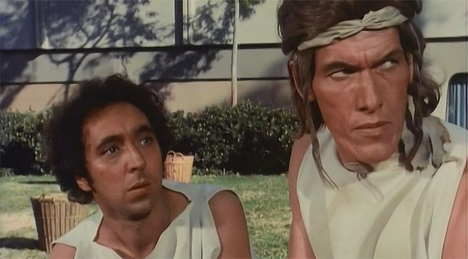
Later on Ted Cassidy’s character, who’s violent stoicism is an obvious prototype of Lt. Worf, will be referred to as a “White Comanche” who’s very heritage makes him an “ideal warrior”. That description may work ok for you when applied to a bumpy-headed alien, but when it’s pointed at a white guy with a head band playing a Native American it just seems icky. These are some embarrassingly mixed messages from the guy whose more ardent fans consider him the most racially progressive writer to ever grace Hollywood. Gene, no doubt didn’t mean to be so tone deaf and, for me at least, his dedication to racial harmony is nothing but sincere. But if you’re going to talk about a man’s vision you’re going to have to eventually bring up his myopia.
Worst of all, Lyra-a really is an evil, mutant temptress in the same vein of many female antagonists in the Original Series. She convinces Hunt, almost solely with the power of her bare midriff, that the PAX are the villains and that he needs escape with her to the mutant’s city. Much of the discussion of Lyra-a is similar to that of Spock’s dual genetic/cultural nature, but with a lot less nuance. Her mutant side apparently drives her to trick and seduce Hunt into helping her people, but her human half just wants the love, strange love, a well-groomed NASA mustache teaches. It’s all the pain and frustration of a mixed race individual condensed into a good girl/bad girl trope.
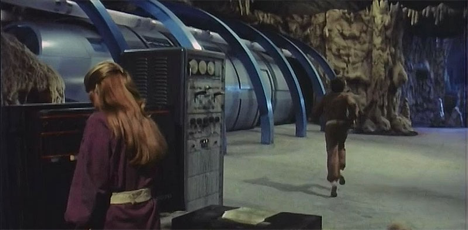
What really sets Hunt against the PAX, however, isn’t Lyra-a’s arguments but the fact that the PAX have abandoned all their “animal lust” which they blame for the war that leveled the planet. Their civility stems from their gender egalitarian nature where men and women dress the same, talk the same, and do the same work. All this equality somehow precludes serious boning. This, unfortunately, is a common misconception that still exists today – women are sexless by nature and only through the prowess of a man will there ever be physical love. By extension, a society in which the sexes are equally respected will be bland and passionless as the male libido will be automatically repressed. So when Hunt can’t seduce his pure PAX caretaker he immediately makes a run for the mutant city of Tyrania. Again, the plot literally revolves around Hunt’s fickle pickle.
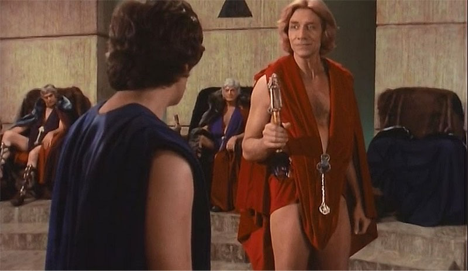
To his credit, Roddenberry, with the help of master designer William Ware Theiss, was as interested in sexually objectifying men as he was women. While the PAX have their sexless, brown jumpsuits, everyone in Tyrania, including Dylan Hunt, struts around in barely-there togas that would make Zardoz blush. While the original Star Trek’s miniskirts and overly revealing dresses are impossible to defend, it should be acknowledged that William Shatner’s clean shaven chest was on display as often as could be rationalized. This attitude would continue into Next Generation where both the guys and the gals wore short skirts and skin tight spandex. It’s interesting to note that in Next Gen’s third season, as Gene’s influence waned, the skants disappeared, the alien costumes became more conservative, and only the women continued to wear tight uniforms.
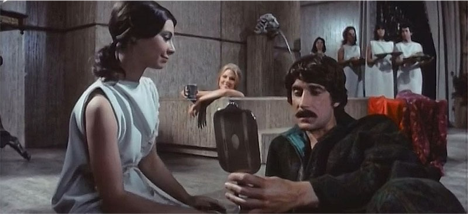
After a few happy days lounging in retro-futurist Roman splendor getting his mustache trimmed and being hand fed by white-clad nymphs, Hunt starts to realize Tyrania is not all it’s cracked up to be. There is a rigid caste system and institutionalized slavery is rampant. When Hunt refuses to fix the Tyranian’s aging nuclear plant one of their luxuriously coiffed leaders attacks him with a sadomasochistic weapon called “the stim” which is capable of delivering pleasure as well as pain (again, shades of Spock’s Brain). He’s rescued by undercover PAX agents who are there to foster a slave revolt. Hunt agrees to help them, makes a magic weapon-sensing device, gets captured and freed again, and finally convinces the slaves to rise up and flee.
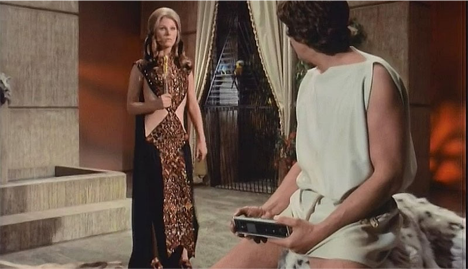
In the end Hunt tricks Lyra-a into expressing love for him by claiming his “weapon detector” is actually a “truth detector”. Because he sees her feelings are real and “human” he finally agrees to abandon his new PAX friends in order to fix the Tyranian nuclear reactor. Days go by and the PAX consider Hunt dead until he shows up at their base asking if they saw the nuclear blast he set off. Apparently, in one last act of deceit, the Tyranias actually wanted him to fix a left over nuclear warhead that was aimed at the PAX. Several technicians were killed in the blast, much to the disapproval of the PAX leadership who abhor the violence of the olden days.
Pacifism is another of Roddenberry’s core beliefs and it’s the only one that is completely immune to criticism and cynicism. When Hunt insists he did what he had to to save their bacon the PAX tell him they are all willing to give their lives before taking the lives of others no matter what the reason. The discussion is ended when the nuclear shock wave finally hits the PAX base, blowing everyone over and terrifying a group of children. The sight of the PAX children huddling in fear of what Hunt has done convinces him to only reconstitute the best achievements of his time and abandon the violence of the past for this new way of peaceful coexistence.
This is a really well earned and completely earnest moment as well as a very interesting turn for a Roddenberry hero. Kirk and Picard are civilized men who almost always have answers to the big questions. Their pontifications on humanity are legendary. Hunt is a different breed. He is the kind of savage who destroyed this world. Despite all his advanced technical knowledge it is he who will need to be civilized.
Almost all pilots are sloppy affairs. They need to create new characters, worlds, and antagonisms and often, as is the case with Genesis II, in only one hour. This final moment tells me the show, no matter how flawed, would have had real potential to do something different: teach the world Roddenberry’s utopian views by learning with the lead character instead of by being preached to by him. That’s a show I’d happily watch the crap out of.
Of course, Hunt ruins the entire mood in the closing shot by trapping a PAX woman in an elevator and making a really gross pass at her with the line “I bet you have a great pancreas”. Nice one, Gene.
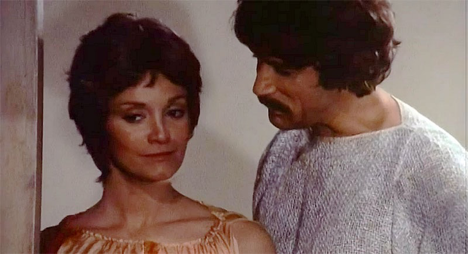
Here’s some of my stray, uncategorized thoughts and observations:
• Majel Barrett is part of the PAX leadership. She doesn’t do much, but it’s great to see her.
• “Women’s Country” is alluded to. This will come up again in the second pilot attempt for this series, Planet Earth.
• The hyperloop style “subshuttle” that can take characters across the world in minutes is a very cool effect that must have cost a lot of the budget. You can be sure stock footage of it would have been used the same way the Enterprise was in future episodes.
• The PAX have no knowledge of medicine or medical equipment. Intravenous needles are alien to them. Percy Rodriguez is utterly shocked that Hunt wants them to “inject an alien substance into his body”. Yet their only hand weapon is a hypodermic needle that delivers a knock-out drug. This is an inconsistency that would have become harder to explain in a long running series.
• It’s also odd that the PAX are so unwilling to take a single life to protect themselves, yet they’re ok with unleashing thousands of armed, blood-thirsty slaves on the Tyranians.
• The show’s opening title font is Rude Extra Condensed Black if you’re the kind of person who cares about such things.
Up next: Spectre.

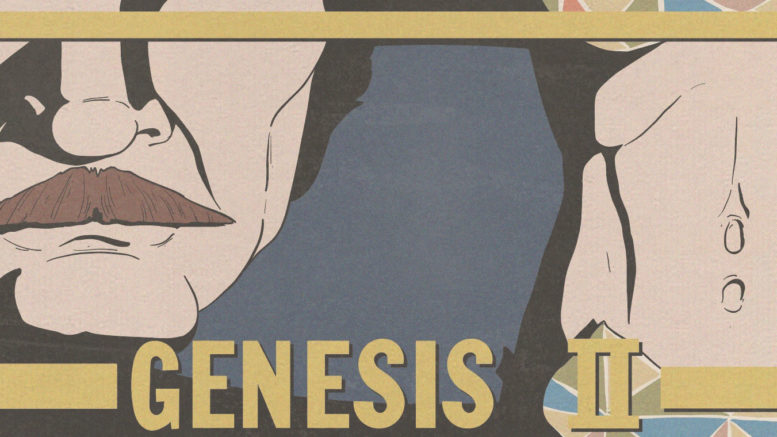
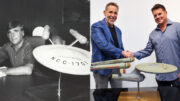

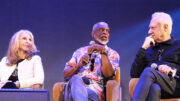
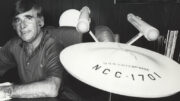
If memory serves, the good ratings were because Star Trek was about at its peak in syndication around then, and the Roddenberry name drew in a lot of fans. Genesis II wasn’t all that good, but neither was “Encounter at Farpoint”. It could have turned into a good show if given the chance. Well, probably not. Regarding the racial insensitivity, it was a product of its time. Even the uber-liberal “M*A*S*H” had a character named “Speerchucker” at first.
Not to defend MASH, but it was about a time 30 years prior to its air date. Genesis II was written by someone who was supposed to be ahead of his time. It’s hardly a fair comparison. I’ve never been convinced by the “product of its times” argument for excusing bad ideas. In every backwards era you can find works that don’t do those things. I’d hate for people in the future to wave away our bigotry based on our current political climate.
Spearchucker is also a remnant of the original novel. And I think it jives when you consider that the book is about a bunch of entitled white guys (entitled white SURGEONS) in the 50s making sardonic observations about a world they clearly consider “theirs”. Trapper is so named — if I remember correctly — for literally trapping a girl and not letting her go until she has sex with him. We’d call that rape now, I believe. Father Mulcahey is also nicknamed “Dego Red”. It was kind of a crappy book, steeped in casual mysogny and bigotry. Which I guess helps your point, considering how homogenized the TV show became.
They called him Spearchucker because he threw javelin in college.
Gary,
Re: he threw javelin in college.
There’s no pussyfooting around about it. It was because he threw javelin in college and was black.
Er, pardon my ignorance, but is “spear-chucker” a racial epithet? I (naively, perhaps) hadn’t heard that before.
Naif,
Re: is “spear-chucker” a racial epithet?
Yes, scroll down:
https://en.wikipedia.org/wiki/List_of_ethnic_slurs#S
and you’ll find it.
You must be young.
I’ve seen Genesis II in the late nineties when it was shown on the BBC. As the article says and what also my first impression was, is that it clearly had the Roddenberry traits. But also I have to say, it was pretty boring and unlike Star Trek, Genesis II has aged terribly. I wouldn’t even recommend watching it even if you are a die-hard Trek fan, I’d say watch something like Logan’s Run instead.
Logan’s Run hasn’t aged well, either. Very clearly a product of the “don’t trust anyone over 30!” generation. Only in Logan’s Run, they kill you at 30.
LR (the movie) was state of the art at the time, but has aged horribly, a combination of too much chrome, too many colors, and too much hair!
Logan’s Run (the movie) tells a timeless story and has that retro-futurism feeling that I also enjoy with TOS. :)
@raffie
Let me say that I do not DISlike the LR movie or series at all, in fact Logan’s Run was the very first Blu-ray I watched when I bought a Blu player a couple of years ago. (Talk about optic shock!) I remember when I saw it in 1976 with a “lifeclock sticker” theater giveaway planted in the palm of my hand. I couldn’t go back to my film school classes and mention it without being met with laughter. Still, I enjoy watching it more than I do 90% of today’s movies.
If there was ever a time travel story set in the Motion Picture time period – Earth/Federation fashion would be indistinguishable from Logan’s run. This is demonstrated by the Earth scene in ST:TMP.
Logan’s Run won a Special Achievement Oscar for Visual Effects. That was one year before Star Wars came out.
The same year KING KONG also did, and neither deserved it. The matte shots in LOGAN had us laughing out loud opening day, the characters were like postage stamps stuck on, and there was no attempt to scale the water in the miniature city or put some kind of atmosphere in to take the edge off.Except for the great matte paintings and some practical explosions, the vfx were not at all oscar worthy.
raffie,
Re: it clearly had the Roddenberry traits
It wasn’t just that. When Gene realized he was going to be allowed to actually put something called STAR TREK back on the air again, he very obviously decided that he was going to use STNG to get his shot down story ideas for GENESIS II and THE QUESTOR TAPES on the air. As Yogi Berra was prone to say, “It was deja vu all over again.”
Well chosen elements of this show along with Logan’s Run tacked
onto Star Trek Discovery could be interesting IF done with the
much needed care and adequate forethought. Thoughts on this…?
My preference was always for the second, “Planet Earth” .
Agreed, PLANET EARTH was at least kinda fun. But I flat-out love the end of QUESTOR TAPES, when the antagonist turns out to be a man of genuine ethical stature. Pure Gene Coon, there, I’m sure.
John Saxon > Alex Cord
Mark Farinas,
Re: contemplating the navel
You are forgetting STAR TREK’s whole raison d’etre, i.e. to use science-fiction to get around Broadcast Standards Department censors, and then confusing the fact that they actually succeeded in winning some battles with there being no battles to win.
The no costume titillatingly revealing a woman’s navel rule at NBC was as real as Barbara Eden’s navel covering harem costume there. Of course, what made a navel reveal titillating was in the eye of whoever was reviewing the show for BSD, and so such things were infuriatingly, arbitrarily and inconsistently applied – but that doesn’t mean the battles didn’t occur and that such inanity didn’t have to be addressed. And yes, such things as a censor finding two navels so odd as to be repugnant and thusly ruled incapable of titillating and given a pass did occur as inane as it now all seems.
FWIW, it is documented in Poe’s, aka Stephen E. Whitfield, 1968 tome, THE MAKING OF STAR TREK on page 360: “The navel is also taboo. Why the navel should be even remotely considered a sensual area is a little beyond comprehension. After all many people feel that the navel is not the most attractive thing in the world. Nevertheless, you are not supposed to show it or call undue attention to it.”
Trek’s costume designer, Bill Theiss, explains his theory of titillation there as “…the degree to which a costume is considered sexy is directly dependent upon how accident-prone it appears to be.”
You have to take everything Gene has said with a grain of salt. Some of it is hyperbole, some of it is outright lying. For instance having to fight NBC to get a mixed race crew on the show. The networks were scrambling for multi-culti material at the time. I Spy, Mission Impossible, Laugh In, The Green Hornet are all Star Trek contemporaries with multiracial casts. Gene also probably lied about NBC not wanting a woman as second in command in The Cage. They were fine with it. They just didn’t like Majel’s acting. So when I see a multitude of examples of something Gene said the networks wouldn’t do with the actress herself unable to corroborate on a season Gene had a very small active role on, I tend to toss it in the “myths” pile.
Love Star Trek. Not Wild about Roddenberry
Mark2000,
You also have to take everything the networks and their execs put out about their “reconstituted past”, as the writers Bob and Wanda Duncan put it, with just as much salt. William S. Paley comes to mind as notorious for re-spinning things to make him look good when the truth was he was behaving anything but admirably.
And again, I remind people don’t make the mistake of assuming because some 1960s Broadcast Standards Department battles were won in that something taboo aired that such taboos ended because of it, or never existed in the first place.
Except that it’s not the network who called Gene out. Most of that info comes from Herb Solow who was part of Desilu, not NBC, and Robert Justman, who was Gene’s partner all the way into TNG. Their book Star Trek: The Real Story is a very interesting read if you’re interested in a different take from people who were there.
Mark2000,
Re: Herb Solow who was part of Desilu, not NBC
I don’t know what you are trying to peddle or what was peddled to you but Herb Solow was hired by Desilu because of his long prior employment as a program director at NBC and for his contacts engendered there.
You are wrong when you tried to infer that because Herb was employed by Desilu that he therefore did not have a very pro NBC executive view.
I have read Herb Solow. His observations for me have the very Paleyesque aesthetic, he had worked for CBS as well, of a network executive of the era which he had been.
This is not to say that either man’s view was all wrong or all right but that the truth lies somewhere between the two.
Solow’s book title makes it very clear that the two co-authors approached it with an ax to grind, which is why I feel it needs to be taken with equal quantities of salt.
And Herb was fallible. He could get things wrong. In interviews, he claimed Lucy didn’t have a funny bone in her body and couldn’t tell an off-the-cuff funny story and get a laugh to save her life. Well, I saw her on CBS’ DECADES network in a 1970s rerun of THE DICK CAVETT SHOW devoted entirely to interviewing her, and Herb was dead wrong. She might not be able to do stand up, but she could elicit laughs responding to Cavett.
Herb also claimed Gene didn’t fool NBC with the Majel/Chapel hair color change but also said that he saved Gene from being fired by Lucy because Gene had gotten away with it.
And as for Justman being Gene’s partner, well, so was Majel.
You’re comparing an opinion – Lucy isn’t funny – to a set of facts that are observable and objective. I also find that axes are ground because they need to be. There is no real reason for these two guys to go after Roddenberry if it wasn’t true. Gene was out for Gene. Everyone else would, therefore, need to be in a vast conspiracy against him – including the facts that are easy to find. I think I take a pretty measured approach to Gene, but some things are undeniable and I’ll touch on them more in later reviews. But, at this point you and I are just discussing who can dole out the best ad hominems against their sources.
Mark2000,
Re: Gene was out for Gene
I don’t contest that. Nor do I contest that he spun things to favor himself and got some things things clearly wrong in service to that end.
I only point out that likewise Solow was out for Solow.
Let’s be honest: one couldn’t be a successful entertainment executive in the male dominated industry of the era without the facility to self-promote and spin with a healthy dose of blowing one’s own horn.
And like Gene, Herb could tell contradictory tales. Which version about Majel’s hair color recasting is accurate (Did Gene get away with it or didn’t he?) and why would Solow go to Herculean efforts to battle for Gene’s job with Lucy’s personal publicist, Howard McClay, over it when, I don’t think I’m overstating this but acknowledge the possibility in attempting to properly gauge his spin on Roddenberry and associated events, he claimed Gene was a no talent hack who had one good idea in regards to the production of the first STAR TREK series?
I was born in the 1950s and lived aware in the era of the 60s and beyond. All that I am trying to demonstrate about interpreting facts from back then is, for example, that it is a non sequitur to conclude that because I can show that some writers who claimed they were blacklisted got paychecks writing under pen names that therefore HUAC’s tilled blacklists never existed and no one lost work because of them.
But if it’s documentation you desire, from a tome first published in 1970, FROM THOSE WONDERFUL FOLKS WHO GAVE YOU PEARL HARBOR By Jerry Della Femina with BELLY BUTTON emphasis from moi:
https://books.google.com/books?id=QL-5lfFsoukC&printsec=frontcover#v=onepage&q&f=false
“You don’t spend $50,000 or $60,000 to make a commercial and just put it on the air. It’s not that easy. There are rules and regulations and censorship. There is so much of this that it’s goddamn funny and stupid. Sooner or later every commercial is passed on by someone. The National Association of Broadcasters is the national bunch of censors and they pass on commercials on certain sensitive subjects, like cigarette advertising, personal products, feminine hygiene products, and parts of the body like the BELLY BUTTON. The National Association is very strong on BELLY BUTTONS. If you get by the N.A.B., then you’ve got to deal with the networks, which have their own censors. And the individual stations, they’ve got their censors too.
One of the biggest problems that all agencies have is the headache of censorship. There is simply no reason to it. Censorship, any kind of censorship, is pure whim and fancy. It’s one guy’s idea of what is right for him. It’s based on everything arbitrary. There are no rules, no standards, no laws. The problem is, the Code of the National association of Broadcasters changes every week; each week a new directive comes out of the N.A.B. I don’t follow any rules or standards or laws when I do commercials because how can I? What is O.K. this week may not be good next week. There are no rules.” — FROM THOSE WONDERFUL FOLKS WHO GAVE YOU PEARL HARBOR By Jerry Della Femina, Simon&Schuster, p192
“What they didn’t figure on was the NBC censor, who takes one look at the commercial and says, “That’s a BELLY BUTTON. My God, you can’t show a BELLY BUTTON.” The theory was that kids might be watching and would see the BELLY BUTTON. Of course the NBC censor didn’t realize that when kids go into their tub every night they look down and they see their BELLY BUTTONS. “ — FROM THOSE WONDERFUL FOLKS WHO GAVE YOU PEARL HARBOR By Jerry Della Femina, Simon&Schuster, pp200 – 201
These passages were also excerpted in newspapers’ of the year 1970.
I might pick that book up.
Mark2000,
Re: Gene also probably lied about NBC not wanting a woman as second in command in The Cage.
You really ought to rethink this Gene probably lied bias you have, because in this STARLOG INTERVIEW Solow says:
https://archive.org/stream/starlog_magazine-241/241#page/n73/mode/2up
“Majel Barrett was dropped as Number One because the network had trouble with
a female in a position of authority.” – Herbert F. Solow, from THE MAN WHO BOUGHT STARTREK by Ian Spelling, STARLOG #241, P74, August 1997
Disinvited
Mark2000,
Re: Gene also probably lied about NBC not wanting a woman as second in command in The Cage.
You really ought to rethink this Gene probably lied bias you have, because in this STARLOG INTERVIEW Solow says [|=i]:
https://arch|ve.org/stream/starlog_magazine-241/241#page/n73/mode/2up
“Majel Barrett was dropped as Number One because the network had trouble with
a female in a position of authority.” – Herbert F. Solow, from THE MAN WHO BOUGHT STARTREK by Ian Spelling, STARLOG #241, P74, August 1997
Mark2000,
Solow clearly had misconceptions about what it was like to deal with NBC’s censors:
“NBC’s censors were just doing their job. The censors dealt us as they did with every other series on at the time. Roddenberry developed scapegoats. The censors at NBC were the main scapegoats. When we made a deal with NBC, we had to adhere to the NAB Code — the National Association of Broadcasters Code — that this is what you can and cannot do. Gene knew about it and even signed a letter agreeing to adhere to the NAB Code. Every show adhered to it. Roddenberry felt he was above that and would do what he pleased. When they said, “No, you can’t do this,” he went to the fans and said, “They’re terrible human beings. They are stopping my creative process.” He was 100 percent wrong. The book spells that out in detail, and it was about time.” – Herbert F. Solow, from THE MAN WHO BOUGHT STARTREK by Ian Spelling, STARLOG #241, P74, August 1997
Femina in 1970, who doesn’t have a dog in either Solow or Roddenberry’s race for STAR TREK glory, shows that the picture Herb tried to paint that all Gene had to do was adhere to the NAB Code and he’d have no problem was just plain untrue:
“Most of the time, though, you can’t fake a censor out so easily. Smith/Greenland, a very good agency, was doing a commercial for Fresh, which is a deodorant. Why is it such clean products have such big troubles? Anyhow, they got past Miss Cheng [the NAB’s censor], I mean they showed Miss Cheng what they wanted to do and she said, ‘Terrific.’
They wanted to picture a belly dancer at her work, showing that she leads a strenuous, active life. … They cut the commercial at a great deal of money, and when Miss Cheng saw the cut she said swell.
They figured they were in. What they didn’t figure on was the NBC censor, who takes one look at the commercial and says, ‘That’s a belly button. My God, you can’t show a belly button.’” — FROM THOSE WONDERFUL FOLKS WHO GAVE YOU PEARL HARBOR By Jerry Della Femina, Simon&Schuster, pp200 – 201
Arrival was a great movie. Intelligent science fiction with a good message. Kinda like the last three Trek movies.
Don’t you mean like the last 3 trek movies could have been?
No like the Trek movies BEFORE the last 3 could have been. What wasted potential the last few decades.
I couldn’t even recall if I’d sen this show, or not.
Then, I saw the still photo of the double navel…..
Ted Cassidy was a highly underrated talent.
I always would have preferred an ASSIGNMENT:Earth show.
I will say it. Star Trek was a mistake for him. I whole heatedly believe that when looking at the rest of his resume. It was the only thing he wrote or created that was any good. And even then, neither show really hit their stride until someone else took over the day to day running of the show. It happened on TOS and it happened again on TNG.
GR certainly milked it.
I disagree. Like I said in the review I like the show. I think it could have gone somewhere really interesting. Also, Gene was running things day to day on TOS until the third season, which is considered the weakest. TNG under Gene was cringy, corny, and sometimes so wrong, but it was at least fun. After season 3 you can see that fun and whimsy slowly drain out of the franchise in favor of faux serious subplots and tech-the-tech puzzles. Gene was great when he had the right team. Without him at all things rarely flourished.
He was certainly not running it day to day (probably would never have approved TRIBBLES), not after the first dozen or so shows. That was Coon, and then JMJ. Gene’s problem with Coon and the humor (basically, the life in the characters that made the whole thing memorable and a lasting phenomena) seems to be indicative of the fact he didn’t know what he had or how it was developing, or more importantly, WHY.
According to Shatner and other sources the show only started to gel once Gene Coon took over the bulk of the producing.
Join the discussion Gene was a writer on a very popular western series in the late 50’s, “Have Gun Will Travel” starring Richard Boone as Palladin, so Gene did have some success in LA prior to striking gold with “Star Trek” in ’66.
Yes, he had some success. But success doesn’t mean good. I haven’t seen much of his early episodic writing. But I have read a couple of scripts from The Leutenant. They seemed underwhelming to me. And pretty much everything he touched after TOS that wasn’t Trek was terrible. Just my opinion.
I believe the digital channel Get TV actually shows The Lieutenant on weekends, if you’re interested. I just saw of an episode with Walter Koenig.
Thomas,
Indeed it does, and the OTA Digital channel HEROES & ICONS, which airs all the Trek series daily, shows HAVE GUN WILL TRAVEL every morning too.
Kind of a snarky review but still always glad to see Genesis II remembered. I guess i’m one of the few Genesis II fans. I love it and finally own it on DVD as well. I was 12 when it premiered on TV and thought it was great. Loved the Sub-shuttle and entire premise. Unlike many of you I did not like the 2nd attempt Earth II with John Saxon.
Ironic that CBS axed Genesis II for the Planet of the Apes series. I was (and still am) a big Planet of the Apes fan and was excited for that series as well but ended up hating it by the 2nd or 3rd episode.
@OldTrekker
You are not alone. I must have been 16 or 17 when it premiered, and I set aside family social commitments to sit glued to our new Magnavox console color TV. I too am a POTA fan, and loved spotting pieces of the LIS sets and props turning up on Apes episodes.
Remember the G-II Sub-shuttle TV Guide article, about the pickup truck pulling the shuttle through the set on a rope? Fun little behind-the-scenes glimpse there. ;)
OldTrekker,
You can get a different take from TrekMovie’s earlier forgotten review of it and its progeny from 2009:
https://trekmovie.com/2009/10/23/reviews-gene-roddenberrys-genesis-ii-planet-earth/
Earth II was TV movie with Gary Lockwood that didn’t involve Roddenberry. The third movie was “Strange New World”.
You are correct. I meant Planet Earth.
Thx.
Finnegan,
Re:Earth II
Wasn’t there also an unrelated to either TV pilot movie and series also called EARTH II that starred Debrah Farentino?
Earth 2 (not II) lasted a full season on NBC in 1994-95. Also starred Jessica Steen and Rebecca Gayheart. It was okay.
I saw it the night it premiered on network TV; loved it then and love it now, in some ways more than ST-TOS. Sad that G-II never got the chance to explore that world in a season or more of one hour episodes. The two follow-up attempts (Planet Earth and Strange New World) were disappointing.
Vokar,
It was filmed in my backyard with the University of California, Riverside serving the role of Tyrannia. After it aired, I always got a kick whenever I had an excuse to visit the campus and be transported to the future.
Also strangely prescient, as I started attended the local JC and the UC provided remote batch access to their IBM 360 model 30 for the computer classes taught there, and Tyrannia started oppressively adding and hiking up fees for that access such as $1200/mo for “security” (for which there was none).
I was disappointed in losing some of the elements that I liked in the subsequent attempts to get the concept a series commitment, but I found the fact that it essentially got 3 pilot movies made novel, and fascinating that Roddenberry had managed to break the two pilot ground, yet again. It even managed a 3rd with out him.
PLANET EARTH, left me with this odd feeling that it had actually gone to series. I think that was because its movie seemed like a bunch of episodes strung together to make a movie. I like John Saxon but I wanted an opportunity to see where Cord would have taken his character.
@Disinvited
Planet Earth was pretty silly IMHO, but not as bad as Strange New World. I don’t think either Cord or Saxon are anything to brag about, but I find Cord a bit more credible, if somewhat boring.
“Starting us off is Roddenberry’s first attempt at a TV show after Star Trek, 1973’s Genesis II which, despite the odd roman numeral at the end, is not a sequel to anything previously produced.”
Genesis allowed is not!
navamske,
Hey this wouldn’t be a Roddenberry comment chain if someone doesn’t point out that II is an EVEN Roman numeral. ;-)
http://www.roddenberry.com/media/vault/STIII-Correspondence.pdf
http://www.roddenberry.com/media/vault/CorrespondenceRoddenberryNimoy.pdf
LLAP
Thanks for those, B!
The more old correspondence of GR’s that I have read, the more annoyed I grow at the people who constantly look for flaws in his work and personality. I think he’s quite diplomatic in most of the memos I’ve seen. Nobody is perfect, and to expect otherwise and actively seek flaws – especially in someone long dead – is more an issue of the one doing the targeting than it is with the person being targeted. The man we call The Bird gave us something often exemplary, and without him there would have been no Star Trek at all. I love these memos and such.
Again, many thanks!
There is nothing which makes Gene admirable & much which shows the opposite. From his rampant infidelity to his total “dick move” of writing unused lyrics for the TOS theme song so he could get half of the royalties (which permanently alienated Courage) and more. Gene was a real piece of work & nothing in these correspondences will change that.
Who cares,
Re: permanently alienated Courage
This is 100% pure prime B.S.:
http://startrekfactcheck.blogspot.com/2013/06/alexander-courages-marvelous-malarkey.html
” There wasn’t any rift, really, with Gene. What happened with Gene was a I got a phone call once…it was Gene’s lawyer, [Leonard] Maizlish. He said, ‘I’m calling you to tell you that since you signed a piece of paper back there saying that if Gene ever wrote a lyric to your theme that he would split your royalties on the theme.’
Gene and I weren’t enemies in any sort of way. It was just one of those things…I think it was Maizlish, probably, who put him up to doing it that way, and it’s a shame, because actually if he’d written a decent lyric we could have both made more money.” — Alexander Courage, Archive of American Television Interview (February 8, 2000)
And another reason why I say the Solow/Justman book needs to be examined with critical eye and its pronouncements NOT just automatically accepted as gospel.
@Disinvited
True, the Solow/Justman book doesn’t wash. From a friend of mine who knew one of them too well, I don’t give the book much credibility. It’s mostly a gripe session.
Who cares,
Re: his rampant infidelity
Not admirable, but not unusual behavior in successful creative television talent executives of the era:
https://books.google.com/books?id=QL-5lfFsoukC&lpg=PP1&pg=PA4#v=onepage&q&f=false
http://www.npr.org/templates/transcript/transcript.php?storyId=128695927
“Literally, from when we started the agency in 1967, we had an agency sex contest. And what did that mean? So, they would literally get a telephone list, and we’re talking about as many as 300 employees. And they would vote for the person they most wanted to go to bed with. And so the two winners, the male winner and the female winner, even though they might not have voted for each other, won a weekend at the Plaza Hotel. It was quote, our secret, and it was sophomoric, but then we would all gather at a Mexican restaurant and lock the doors and we would have this wild, wild, wild party where I would then get up there and after God knows how many margaritas, I would announce the winners. And everybody’s cheering. And the story I always like to tell was at one point, there was an older executive who I think possibly might have imbibed his first taste of cannabis, and he had a lot to drink. And at one point, his head went right into his dish. And sitting next to him was this woman who was our research director, and she said, it’s okay, it’s okay, he’s fine – the guacamole broke his fall. ” — Della Femina, author of FROM THOSE WONDERFUL FOLKS WHO GAVE YOU PEARL HARBOR
Or the Desi for which Desilu itself was named, and I would certainly arch an eyebrow if Solow claimed absolutely none of the NBC executives supposedly complaining about Gene’s had mistresses.
@”Who cares”
But without him and his creation, you wouldn’t be on this page. :)
I’m a fan of the entire Trek franchise, but I’m not going to act like Gene was doing anything prophetic or that he had some vision (other than making money & getting laid) or any of the rest of that “Great Bird” nonsense. As for Courage, considering he never worked on Trek again I’d say its fairly obvious that no matter what diplomatic language people want use now that Gene’s sneaky underhanded moves cost Trek more of Courage’s work. Just as Gene lost several writers in early TNG because he had apparently authorized his lawyer to make rewrites in his name.
Who cares,
Re: he [Courage] never worked on Trek again
Again, 100% pure prime B.S. read the STAR TREK Fact Check:
http://startrekfactcheck.blogspot.com/2013/06/alexander-courages-marvelous-malarkey.html
“Although it is true that Alexander Courage didn’t return to score any individual episodes during the second season of Star Trek, he did record thirty minutes of library music for it — some newly composed — on June 16, 1967. And, during the program’s final season, Courage returned to score two more episodes: ‘The Enterprise Incident’ (recorded August 5, 1968) and ‘Plato’s Stepchildren’ (recorded October 25, 1968). Bob Justman had left the series by the time the score for ‘Plato’s Stepchildren’ was recorded, but he was definitely around during the recording sessions for ‘The Enterprise Incident.'” — Michael Kmet, ALEXANDER COURAGE’S ‘Marvelous Malarkey’, STARTREKFACTCHECK.COM, Tuesday, June 25, 2013
I’m not asking you to not critically examine Roddenberry’s claims about himself. But I am asking you to give the same scrutiny to your other other sources which have led you to make 3 demonstrably false claims about Courage.
@Disinvited:
Methinks “Who Cares” has an axe to grind, but he/she isn’t alone there. Is he? ;)
I think Disinvited has a little too much faith in the Roddenberry myth-making machine, but Courage is something he’s right about. Check the TMP liner notes. Sandy came back to personally orchestrate his theme music in the “Captain’s Log” tracks. That’s hardly “never working on Trek again.” As for the stories about Maizlish rewriting scripts, I have a feeling they are way overblown if not completely wrong. I’ll get into that more in later articles.
Mark2000,
Re: Disinvited has a little too much faith in the Roddenberry myth-making machine
Why do you keep going there when I clearly don’t take a faith based approach to him?
“This is not to say that either man’s [Gene Roddenberry or Herb Solow] view was all wrong or all right but that the truth lies somewhere between the two.” — Disinvited
“I don’t contest that [Re: Gene was out for Gene]. Nor do I contest that he spun things to favor himself and got some things things clearly wrong in service to that end.” — Disinvited
“Not admirable [Re: Gene Roddenberry’s rampant infidelity], but not unusual behavior in successful creative television talent executives of the era.” — Disinvited
“I’m not asking you to not critically examine Roddenberry’s claims about himself.” — Disinvited
You, however clearly take a faith based approach in attacking Roddenberry:
“Gene also probably lied about NBC not wanting a woman as second in command in The Cage.” — Mark Farinas
not even supported by the source where you claim you got that faith:
“Majel Barrett was dropped as Number One because the network had trouble with
a female in a position of authority.” – Herbert F. Solow, from THE MAN WHO BOUGHT STARTREK by Ian Spelling, STARLOG #241, P74, August 1997
“Attacking Roddenberry”. That line says a lot about how you’re approaching this conversation.
There are a lot of reasons to believe the Number One role was created for a lover, not for the love of seeing a woman in command. Roddenberry didn’t think much of women. Number One is a stand out in his career. Not once in any other TV show or movie did Gene create a compelling female character. They were all secretaries, jilted lovers, and succubi. Solow said, “for Gene, a woman’s role was primarily as a decorative tool in a man’s workshop”. Pike said some horribly sexist things in The Cage. The other two women in the episode are an underling pining for her boss and a love doll who won’t leave Talos because she won’t be pretty anymore. His next set of scripts contained space hookers. It’s one thing to to be forced to keep women out of the hero rolls in the 60’s. It’s another to slight them in nearly every episode. When TNG rolled around and he had no reason to not try again he didn’t. He described Crusher as having a stripper walk and wanted four breasts on Troi. Susan Sackett told him “You really put down women a lot for someone who is supposed to be thoughtful and liberal.” (Humanist, April 1991) So to say Gene was going to be a selfless pioneer in the field of women’s lib just doesn’t ring true to me. It’s not faith or an innate hatred that makes me doubt him. It’s a very educated decision.
Mark2000,
Re: “Attacking Roddenberry”
Your lines “another [Roddenberry] fantasy” and “Gene also probably lied” betrays an approach as well.
You used “probably” to modify “lied” because you knew when you made that statement that you had nothing to offer by way of a proof for the lie claim. Your willingness to resort to innuendo there, in your article and in other responses to me says a lot about how you’re approaching this topic.
Re: Roddenberry didn’t think much of women.
How do you commiserate this view of the 1960s Roddenberry when, despite being a typical man of this time in the entertainment industry as you would permanently pigeonhole him, his secretary was promoted by him to scriptwriter and then again to story editor? And I certainly hope you realize that she most certainly adopted “D.C.” to address males, other than Roddenberry, in the industry who had problems with hiring women as writers when their place clearly was the secretarial pool where most male network power holding types wanted working women properly consigned both on and off screen?
Re: There are a lot of reasons to believe the Number One role was created for a lover, not for the love of seeing a woman in command.
The one does not follow or preclude the other. Cite one credible reason to believe this contention of yours other than the equally as self-contradictory as Gene, Solow. Heck, even you yourself claim this was an exception and NOT the rule that you are trying to make it out to be, i.e. you claim you can’t name one other mistress, either before or after Majel, for which Gene wrote an equally exceptional role.
Re: Solow said
I have already provided the citation where your source, Solow, indicated it was the NBC network, and not Gene, that proscribed STAR TREK’s female characters from better.
“Majel Barrett was dropped as Number One because the network had trouble with
a female in a position of authority.” – Herbert F. Solow, from THE MAN WHO BOUGHT STAR TREK by Ian Spelling, STARLOG #241, P74, August 1997
Solow also falsely claimed, in service to the notion that you are attempting to peddle that Roddenberry only wrote well for his mistresses, that Grace Lee Whitney was one of them. She vehemently denied being his mistress.
Re: His next set of scripts contained space hookers
That you have no compunction repeating Solow’s mischaracterization about Stephen Kandel’s script based on Gene’s idea of Trek exploring the Old West’s mail-ordered brides phenomenon says a lot about how you’re approach, as well.
How do you reconcile your “fact” with one where your purported progressive network, NBC, maintained its untarnished women’s rights halo while not only failing to kill such a hooker tarnishing story, as you characterize it, immediately when it was pitched, but allowing it to develop and be aired zooming right by their uncloaked-belly-button-fearing, Mrs. Messerschmidt, astounds.
Re: So to say Gene was going to be a selfless pioneer in the field of women’s lib just doesn’t ring true to me.
Would you please spare me from these constant strawman introductions. I certainly made no such claim.
I have merely demonstrated that certain innuendos which you claim were highly likely or darn near incontrovertible, were, in fact, not.
However, I do wonder with reflection on your part if you can come to comprehend how Solow saying NBC was going to be a selfless pioneer in the field of women’s lib rings equally untrue for me?
Courage being back for TMP is ENTIRELY due to his friendship with Jerry Goldsmith (and also the latter not wanting to have anything personally to do with using the TOS theme; in 79 he said that if he knew he would be required to incorporate the Courage material in his score, he would not have taken the job.) I’m sure the composers probably figured this was a way to get Courage some money and then some, making up for the business-as-usual GR approach.
kmart,
Re: Courage being back for TMP is ENTIRELY due to his friendship with Jerry Goldsmith
That’s not exactly what Sandy told STARLOG #107, in June of 1986. According to him it was those pesky letter writers:
https://archive.org/stream/starlog_magazine-107/107#page/n19/mode/2up
“I wasn’t asked to score the [STAR TREK] films because, by that time, I was kind of retired. And there’s a hierarchy involved. Certain people are feature picture scorers. When the first film was about to be scored, an acquaintance asked me if I was going to do it. I told them no, Jerry Goldsmith was doing it. Then, I was asked if they were going to use my theme, and I said, ‘Of course not! Jerry will write a new theme. Which is what he should do.’ When I did The Waltons, which had Jerry’s theme, I didn’t use his theme, except for the first couple episodes. So, why should he use my theme? But, they had so much mail, apparently, that he finally called me, rather reluctantly, and asked me if I would write a 15-second version of my theme and a 30-second version. It was used somewhere in the picture. Of course, James Horner [STARLOG #63] has used it in each of his films because they told him he had to, and that’s all there was to it.” — Alexander Courage in ALEXANDER COURAGE: and the music of STAR TREK by Randy & Jean-Marc Lofficier, STARLOG #107, June of 1986, p19
What you’re addressing is WHY the music was used, not why Courage himself was involved in the writing of it. That’s JG’s call, confirmed in some detail in RETURN TO TOMORROW … otherwise they could have had any hack cough out a variation on the TOS theme.
kmart,
Re: they could have had any hack cough out a variation on the TOS theme
You are putting too much import on his TMP composing for economic reasons. Courage, along with fellow STAR TREK TV composer Fred Steiner, was already employed orchestrating Goldsmith’s score on TMP because that film’s production chaos created so much work overload as it did in all the other aspects of finishing the film. So he hardly needed to compose the theme for the economic reason you cite. Rather, it made more sense to hire him to compose the theme rather than some outside hack because he was already there arranging and more than familiar with the old and new material in a tight music production schedule that could not even afford the delay of some hack familiarizing his or her self with the theme and the new music in order to churn out an appropriate variation.
And Courage indicated in the article I already cited that he made far more money collecting royalties from the STAR TREK TV theme as it was:
“I told Gene Roddenberry that I was very sorry, but I really couldn’t stay with the show, because I had a much more important thing, to do at 20th Century Fox— I was the associate music director on Doctor Doolittle, and that was the biggest, most expensive, most elaborate musical ever made at that point. I had associate credit before, but never on something that big. So, I said, ‘I’m sorry, but I can’t stay with Star Trek.’ It was very stupid of me, because if I do a musical, I do the musical and that’s it. But if I’m the composer on a TV series, as long as that series is running, I collect royalties on it.” — Alexander Courage
@Disinvited
Many thanks for your helpful and accurate posts. :)
Welcome V, LLAP
The Follow up PLANET EARTH for ABC was MUCH BETTER and got the kinks that GENESIS II had – a better lead in John Saxon (Who was hot after “Enter The Dragon” also from Warner Brothers), More REAL Sci-fi (Like STAR TREK Was) rather than this hippy peace-and-love-agrarian Stuff Gene did here. Blame “Six Million Dollar Man” for That not happening.
Found memories.
I watched this when it first aired so long ago.
Roddenberry tried his hand on a number of different shows.
The Questor Tapes was pretty good, but Roddenberry balked at the substantial changes requested by the network and left the project, leading to its immediate cancellation.
Spectre was another off beat and completely different supernatural detective type show by The Great Bird. Again this didn’t get very far but was released in theaters in the UK.
Something sad I stumbled across in researching NBC censorship, apparently, Jean Messerschmidt of NBC West Coast Standards and Practices out of the KNBC offices, of Trek memo fame recently passed away:
http://www.legacy.com/obituaries/peninsuladailynews/obituary.aspx?pid=181270976
The Making of Star Trek, written while the series was in still in production, claimed not that it was navels but the underside of breasts that was the problem for NBC. True or not, you do see more underboob than you’d expect in later Roddenberry productions.
Nachum,
It wasn’t an either/or but both:
https://books.google.com/books?id=QL-5lfFsoukC&lpg=PP1&pg=PA192#v=onepage&q&f=false
https://books.google.com/books?id=QL-5lfFsoukC&lpg=PP1&pg=PA200#v=onepage&q&f=false
Gene really did like the name Dylan Hunt. Another pilot, “Planet Earth” from 1974 also had the main character named Dylan Hunt, this time played by John Saxon. Both “Planet Earth” and “Genesis II” are on Itunes.
Planet Earth is the universe as Genesis II and Hunt is the same character but a different actor.
The Academy of Television Arts & Sciences’s EMMYS site did a recent deeper write-up of this and Roddenberry’s other unsold made-for-TV science fiction pilots:
http://www.emmys.com/news/online-originals/universe-beyond
@Disinvited
Thanks for the link! The more I watch the GENESIS II pilot, the more disappointed I am that it didn’t get the series nod.
And now Don Marshall, Trek’s Lt. Boma and Nichols’ fiancée on THE LIEUTENANT,
http://www.hollywoodreporter.com/news/don-marshall-dead-land-giants-actor-was-80-943108
has left the stage.